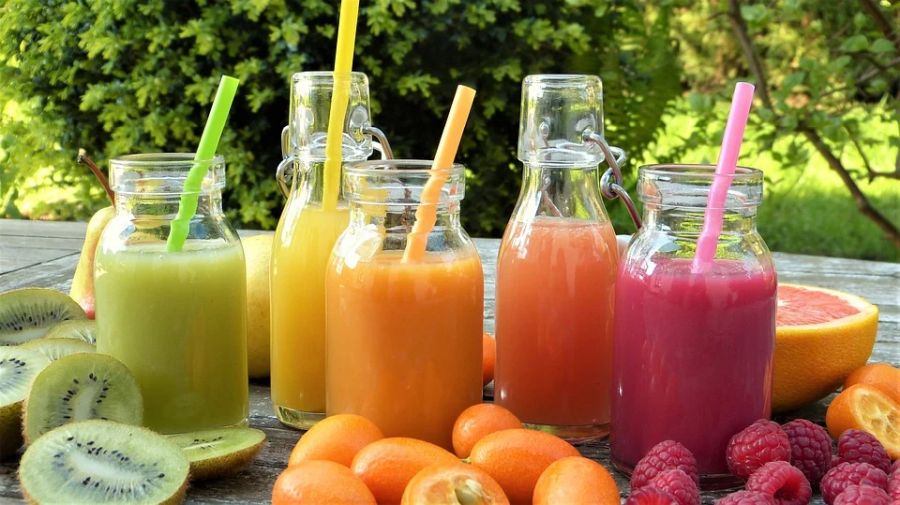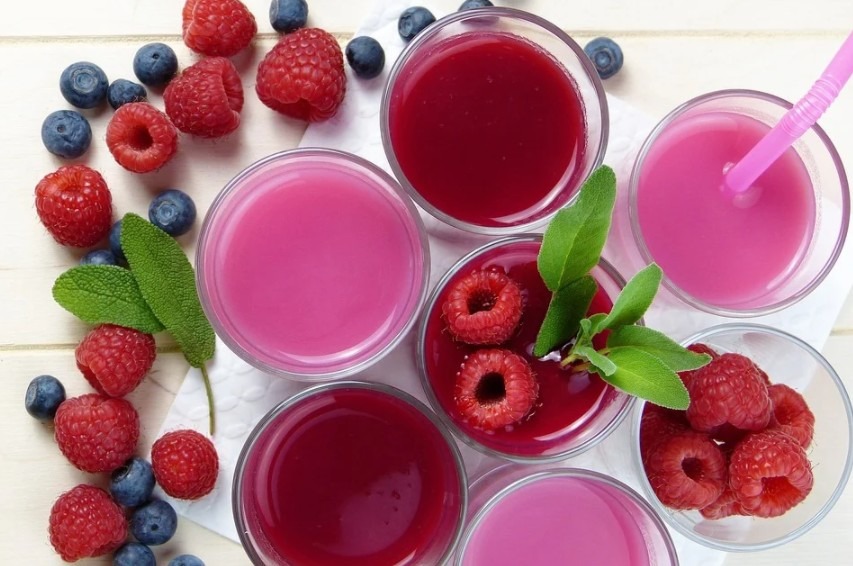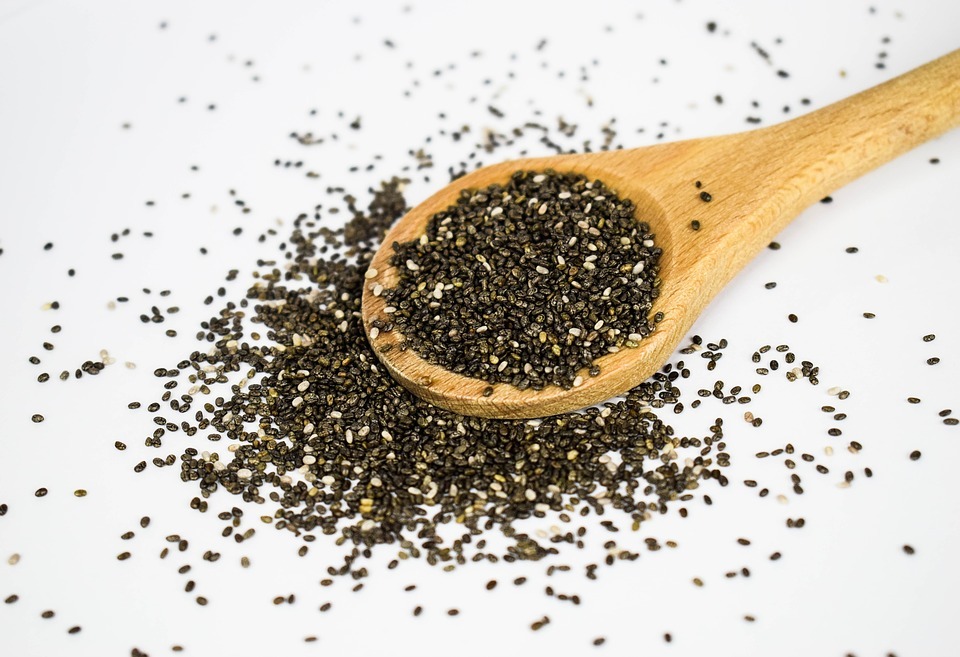Top High Fiber Juices for Your Diet
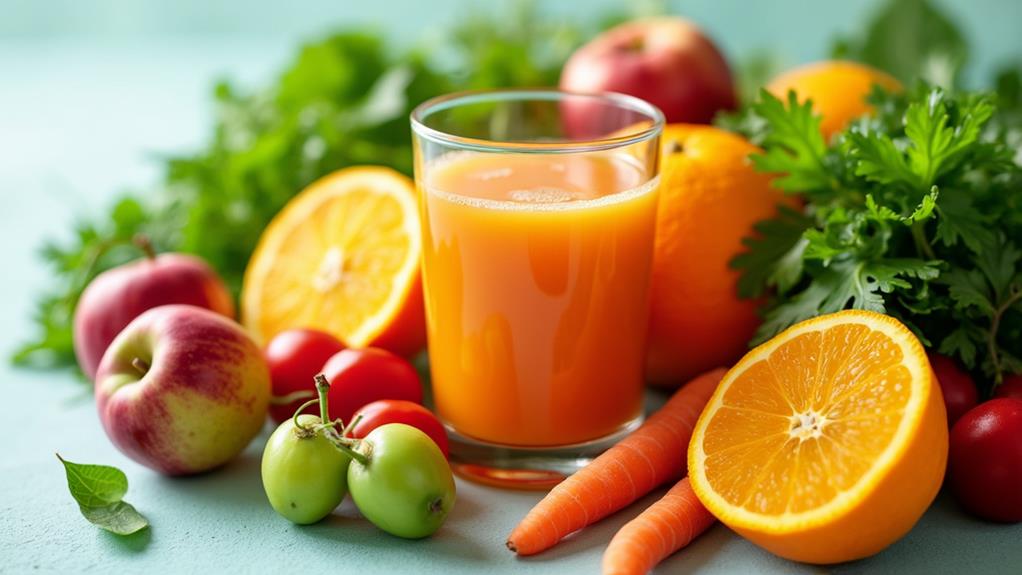
Choosing high fiber juices for your diet can support digestion and increase your nutrient intake. Prune juice, with 2.5 grams of fiber per cup, is excellent for relieving constipation. Grapefruit juice brings you a decent 1.5 grams of fiber and adds vitamin C. Papaya juice offers another 1.5 grams, packed with vitamins A and C for a healthy lift. Orange juice with pulp includes more fiber than regular orange juice, aiding vitamin intake. For a flavorful choice, apple juice contains pectin for digestion. Consider adding pulp to improve fiber content further. Investigate more to uncover the full benefits of these juices.
Understanding Fiber Benefits
When it pertains to understanding fiber benefits, it's important to recognize how this fundamental nutrient impacts your health. Fiber, a carbohydrate found in plants, plays a key role in your digestive system. It promotes healthy bowel movements and helps prevent constipation, making it necessary for maintaining a smooth digestive process. By ensuring you have a high fiber intake, you can greatly improve your general well-being.
Soluble fiber, one type of fiber, transforms into a gel-like substance in your digestive system. This process aids in lowering cholesterol, which offers considerable health benefits. Incorporating more high fiber options, like fruit juices, into your diet can be an effective way to increase your fiber intake. Prune juice, for example, contains 2.5 grams of fiber per cup, making it a smart choice for supporting your digestive health.
Increasing your fiber intake is also linked to a reduced risk of chronic diseases such as diabetes, heart disease, and certain cancers. By understanding the benefits of fiber and incorporating fiber-rich foods and juices into your diet, you can support your digestive system and improve your general health.
Soluble vs. Insoluble Fiber
Often, understanding the differences between soluble and insoluble fiber is key to optimizing your diet for better health. Soluble fiber dissolves in water, forming a gel-like substance that slows digestion, which can aid in lowering LDL cholesterol levels. You'll find soluble fiber sources in foods like oats, legumes, apples, and citrus fruits. These not only contribute to digestive health but also help control blood sugar levels. On the other hand, insoluble fiber doesn't dissolve in water. Instead, it adds bulk to your stool, promoting quicker digestion and providing constipation relief. Whole grains, nuts, seeds, and many vegetables are excellent insoluble fiber sources, facilitating regular bowel movements.
Including both types of fiber in your diet offers numerous health benefits:
- Digestive Health: Both soluble and insoluble fibers support a healthy digestive system.
- Constipation Relief: Insoluble fiber helps prevent constipation by adding bulk to stool.
- Regulating Bowels: The combination aids in maintaining regular bowel movements.
- Chronic Disease Prevention: A balanced intake of fiber reduces the risk of chronic diseases.
Incorporate these fibers into your diet with high-fiber juices made from fruits and vegetables, ensuring a balanced approach to health and wellness.
Daily Fiber Intake
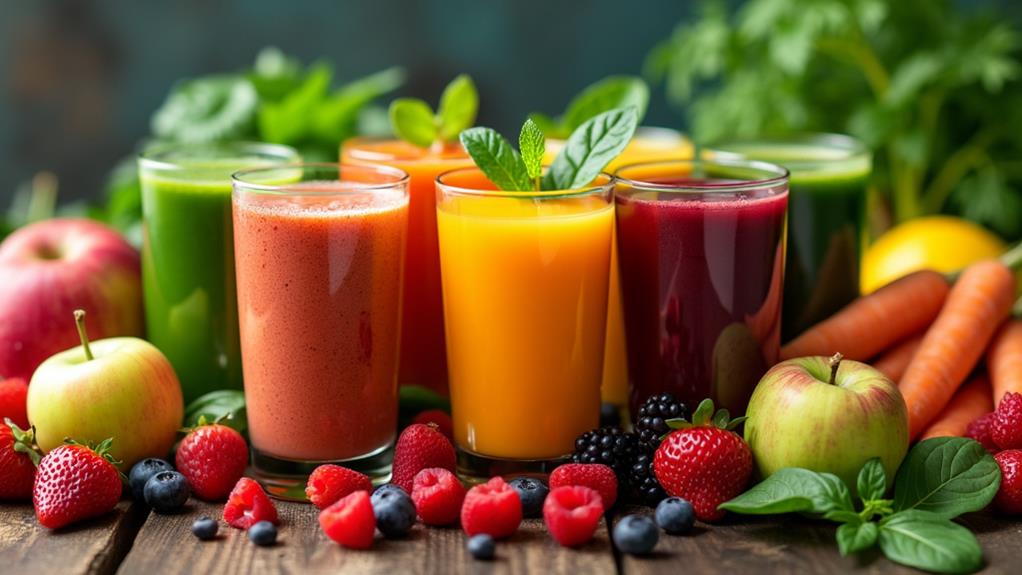
Understanding how to incorporate both soluble and insoluble fiber into your diet can greatly enhance your health, and knowing how much fiber you need daily is likewise vital. For men under 50, the recommended fiber intake is 38 grams, while those over 51 should aim for 30 grams. Women under 50 are advised to consume 25 grams, and 21 grams for those over 51. Increasing your fiber intake can be achieved through whole foods and high-fiber juices. These juices, particularly those made from fruits and vegetables, offer a convenient way to elevate your fiber intake.
Soluble fiber found in some fruit and vegetable juices can help lower LDL cholesterol levels and regulate blood sugar, contributing to better digestive health. On the other hand, insoluble fiber promotes quicker digestion, preventing constipation and discomfort. As you incorporate these into your diet, do so gradually and maintain adequate fluid consumption to avoid digestive issues. The water content in juices helps with this. A higher fiber intake is linked to reduced risk of chronic diseases, making it worthwhile to focus on your daily fiber intake. Remember, the key is balance and gradual inclusion.
Juice vs. Smoothies
While juices and smoothies both offer a revitalizing way to consume fruits and vegetables, they differ considerably in their fiber content and health benefits. Juices typically lack fiber because the juicing process removes the bulk, leaving you with a smoother, less fibrous drink. On the other hand, smoothies retain the fiber content by blending whole fruits and vegetables, making them thicker and more satisfying. This fiber is essential for digestive health and satiety, making smoothies a better choice for those seeking a high fiber intake.
Here's a quick comparison:
- Fiber Content: Smoothies provide 5-10 grams of fiber per serving, while juices usually contain less than 2 grams per cup.
- Texture: Smoothies have a thicker texture due to their fiber content, whereas juices are smoother and less filling.
- Digestive Health: The fiber in smoothies supports digestive health, helping to keep your system running smoothly.
- Customization: Juices can be improved with added pulp or fiber-rich ingredients, but smoothies naturally maintain more fiber without extra steps.
High Fiber Fruit Juices
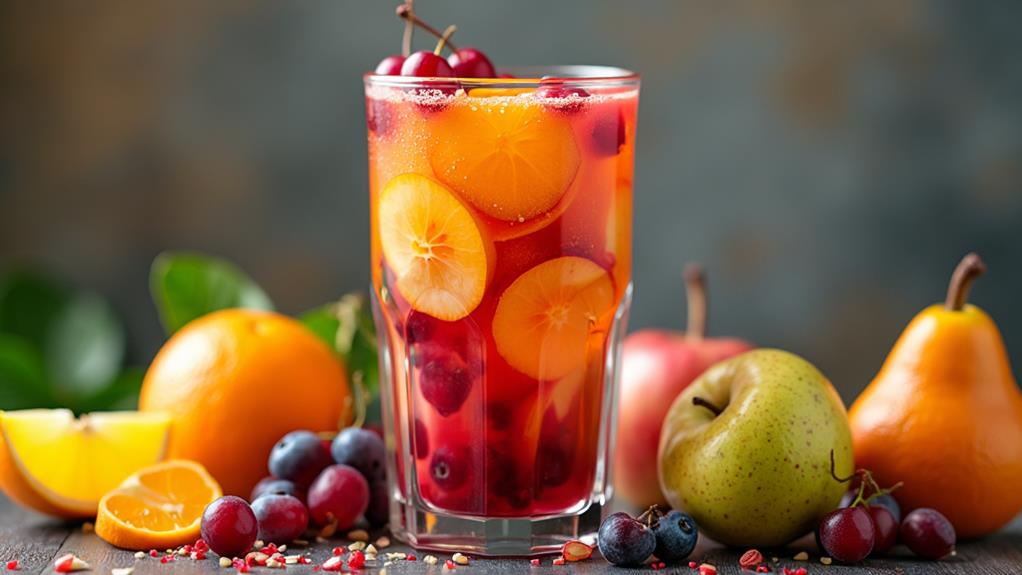
Juices can be an invigorating part of your diet, but if you're aiming for more fiber, certain fruit juices stand out. Prune juice, for example, is a top high fiber choice with 2.5 grams per cup. It's famous for its ability to alleviate constipation thanks to its sorbitol content. Grapefruit juice offers a respectable 1.5 grams of fiber per cup, making it beneficial for digestion. Plus, it's a great source of vitamin C, promoting general health.
Papaya juice is another excellent option, also providing 1.5 grams of fiber per cup. It's packed with vitamins A and C, which are vital for maintaining good health and aiding digestion. While lower in fiber, apple juice contains 0.5 grams per cup and offers pectin, which helps with digestion and cholesterol management. However, keep an eye on its sugar content and consume it in moderation.
Lastly, consider orange juice with pulp. It has slightly more fiber than regular orange juice, contributing to your intake of vitamin C and helping with iron absorption. These high fiber fruit juices not only support digestion but also offer a range of vitamins critical for your health.
Prune Juice Properties
Prune juice packs a powerful punch regarding digestive health, thanks to its impressive 2.5 grams of fiber per cup. This high fiber content is crucial for promoting regular bowel movements and alleviating chronic constipation. It's not just the fiber that makes prune juice effective; it's also rich in sorbitol. Sorbitol is a natural sugar alcohol that draws water into your intestines, softening stools and making them easier to pass.
Here's why you should consider incorporating prune juice into your diet:
- Fiber Content: Each cup provides 2.5 grams of fiber, critical for digestive health.
- Sorbitol: Helps soften stools and promotes easier bowel movements.
- Potassium: A single cup offers about 10% of your daily potassium, supporting heart health and muscle function.
- Vitamins and Minerals: Prune juice contains iron, magnesium, and vitamin K, offering a variety of nutritional benefits.
Healthcare professionals often recommend prune juice as a primary therapy for chronic constipation due to its efficacy. By including prune juice in your diet, you're not only supporting your digestive health but also enhancing your comprehensive nutritional intake with crucial vitamins and minerals.
Enhancing Juice Fiber
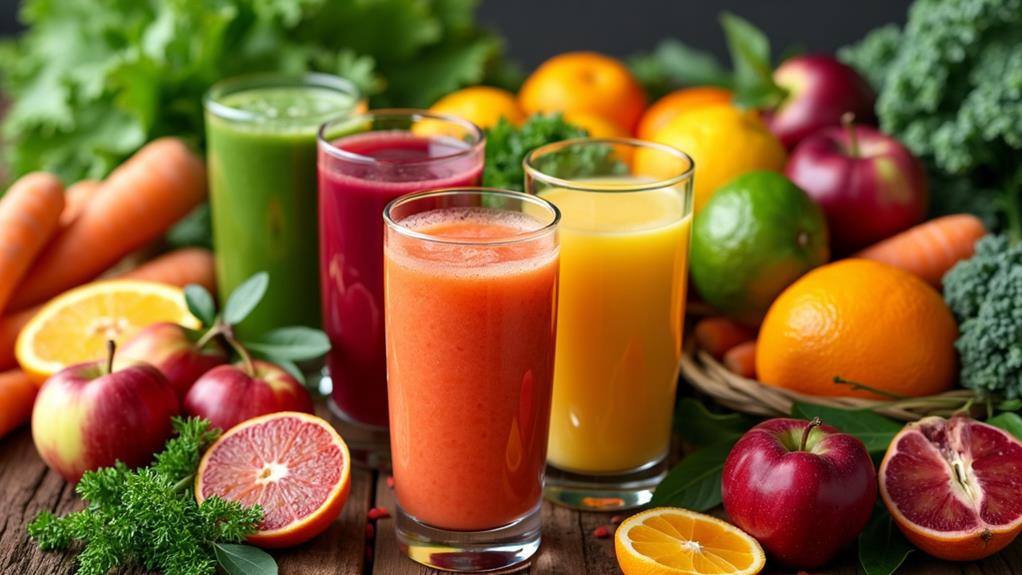
For those looking to improve the fiber content of their juices, consider incorporating simple techniques that can make a big difference. Start by adding pulp back into your juices. This not only elevates the fiber content but also aids digestion, turning your drink into a high-fiber powerhouse. If you prefer smoothies, toss in some chia seeds or flaxseed meal to further improve their fiber-rich profile. These supplements can seamlessly blend into your drink, offering a satisfying texture and added health benefits.
Blending whole fruits, rather than just juicing them, is another effective way to retain fiber. This method guarantees you get more than just the juice, as it includes the fibrous parts of the fruit, leading to a thicker, nutrient-dense beverage. Furthermore, pairing your juices with fiber-rich snacks like whole-grain crackers or nuts can help you meet your daily fiber goals.
Nutritional Juice Profiles
Understanding the nutritional profiles of different juices can profoundly impact your dietary choices. When selecting fruit juices, focusing on fiber content and health benefits is essential. Here's a quick guide to some of the top high-fiber juices you might consider incorporating into your diet:
- Prune Juice: With 2.5 grams of fiber per cup, prune juice stands out for its digestive health benefits. It's high in sorbitol, helping to soften stools and ease digestion, making it a go-to choice if you're looking to improve regularity.
- Apple Juice: Although it offers only 0.5 grams of fiber per cup, apple juice provides pectin, which aids in cholesterol management and supports digestion. It's a flavorful option with some added health benefits.
- Pear Juice: Delivering 0.8 grams of fiber per 100 ml, pear juice is high in sorbitol, making it a gentle digestive aid, particularly for children. It's a soothing choice for those with sensitive digestion.
- Grapefruit Juice: Offering 1.5 grams of fiber per cup, grapefruit juice is not only beneficial for digestion but also rich in vitamin C and antioxidants, promoting general health and wellness.
These fruit juices can improve your diet through their unique nutrient profiles.
Juices for Digestive Health
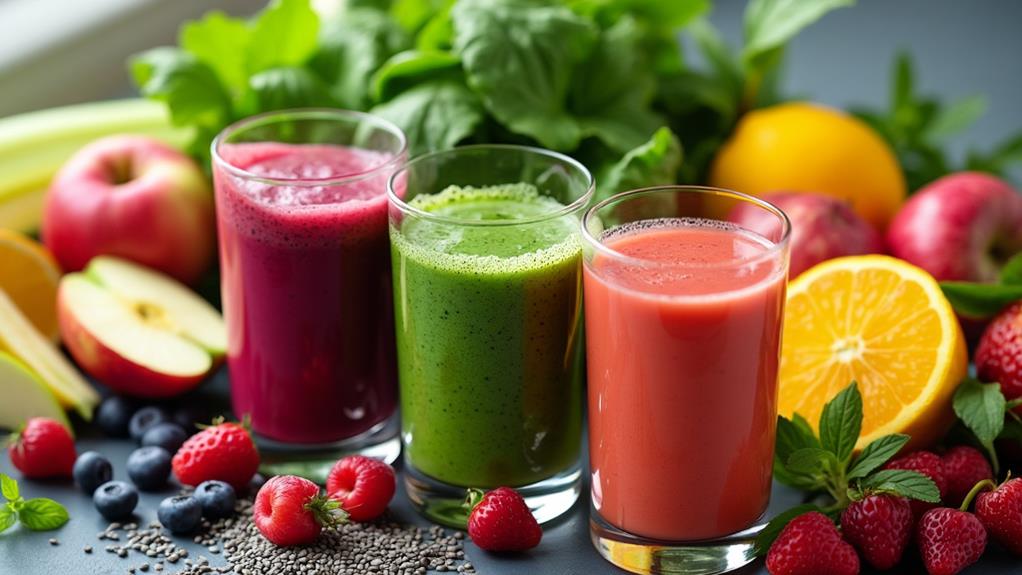
Incorporating the right fruit juices into your diet can greatly benefit digestive health. Prune juice stands out as a top choice, being high in fiber with 2.5 grams per cup. It's packed with sorbitol, which helps soften hard stools, making it highly effective in relieving constipation. If you're seeking a gentle option, pear juice is a great alternative. It contains even more sorbitol than apple juice, providing mild laxative effects that are often preferred by children for its sweet taste.
Grapefruit juice, with 1.5 grams of fiber per cup, not only supports digestion but also enhances your immune system due to its high vitamin C content. For those looking to improve blood flow and overall digestive health, beet juice is a solid option. It offers 1 gram of fiber per cup and is abundant in nitrates. Although cranberry juice is lower in fiber at just 0.1 grams per 100 ml, its antioxidant properties can still aid digestion and promote urinary tract health.
Each of these juices offers unique benefits, so incorporating them into your diet can greatly improve your digestive health and overall well-being.
Incorporating Juices in Diet
Incorporating high fiber juices into your diet can greatly improve digestive health and general well-being. Prune juice is a standout choice, offering 2.5 grams of fiber per 240 ml to help alleviate constipation and improve digestive health. To optimize fiber intake, consider adding pulp to your fruit juices, transforming them into a more nutritious option. For those keen on increasing daily fiber intake even further, smoothies are an excellent alternative since they retain all the fiber from whole fruits and vegetables.
Here's how to effectively incorporate high fiber juices into your diet:
- Opt for Prune Juice: It's excellent for easing constipation while supporting your gut health.
- Add Pulp: When making or buying juices, choose options with pulp to elevate fiber content.
- Blend Smoothies: Use whole fruits and vegetables to guarantee you're getting the highest fiber and vitamins.
- Mix Juices: Combine apple and pear juices, rich in sorbitol, to promote bowel regularity.
Moderation is key when consuming 100% fruit juices like V8 High Fiber Original. They're a tasty way to meet your fiber goals while enjoying important vitamins and minerals, contributing positively to your complete health.

